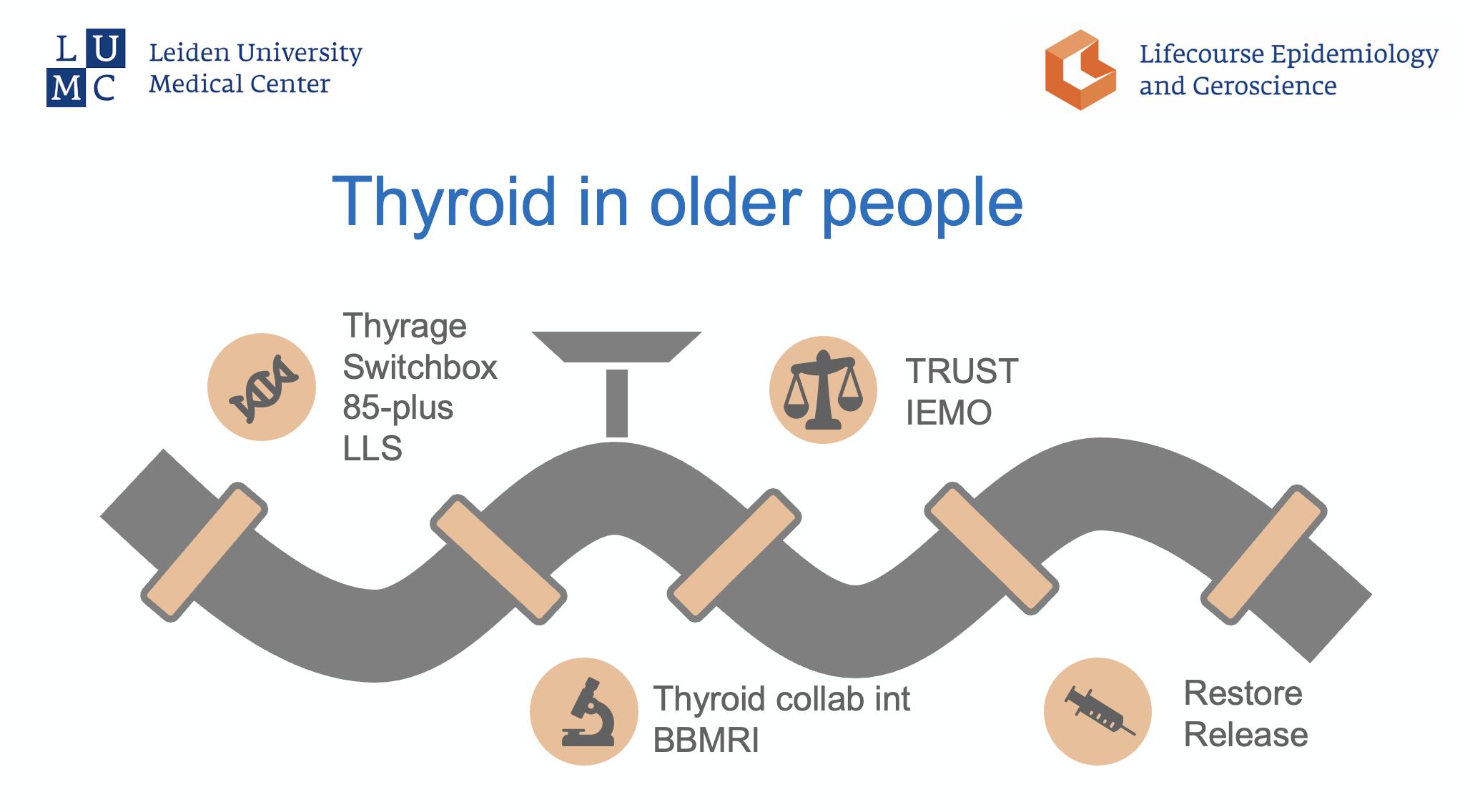
Thyroid pipeline
In the past two decades researchers of the Theme have performed bench-to-bedside research in the aging thyroid.
Observational clinical data
- In the Leiden 85-plus Study, a prospective follow-up study in the oldest old, we showed that in the general population older individuals with abnormally high levels of thyrotropin do not experience adverse effects and may have a prolonged life span.
- In several meta-analyses of the Thyroid Studies Collaboration, initiated by researchers of the Theme, we showed that subclinical hypothyroidism in older persons gives higher risks of negative outcomes (like cardiovascular disease, cognitive decline) only in patients with the highest thyrotropin levels (> 10 µg/l). Since this is a rare laboratory finding in the general population, most older patients with subclinical hypothyroidism do not have increased risks.
Intervention studies
- In TRUST and IEMO 80-plus RCT’s, both double-blind, randomized, placebo-controlled, parallel-group trials involving persons aged 65 years and over with persisting subclinical hypothyroidism, levothyroxine treatment provided no apparent patient benefits compared to placebo. These findings do not support routine use of levothyroxine for treatment of subclinical hypothyroidism in adults aged 65 years and older.
Biological studies
- In Thyrage, we addressed the hypothesis that inappropriate thyroid hormone action in target cells is a common mechanism underlying age-related degenerative diseases and co-morbidities. Human studies assessed the effect of short-term manipulation of thyroid status on markers of tissue maintenance and repair. We performed challenge studies with a low doses of TSH and T3 in participants from the Leiden Longevity Study. The results from the TSH challenge study indicate that members from long-lived families have a lower thyroidal response to TSH. The results from the T3 challenge study point to similar T3 turnover and similar negative T3 feedback control of TSH secretion in members from long-lived families and controls. After the TSH and T3 challenges, transient increases in markers of bone turnover were observed, as well as a transient increase in IGF-1 and a decrease in cortisol, with similar effects in members of long-lived families and controls. In Mendelian Randomization studies, we found no evidence that genetically determined TSH was associated with Bone Mineral Density, Diabetes or anemia. In a mixed-methods project utilizing both Mendelian randomization and metabolomics data, we found a potentially causal association between TSH and risk of coronary disease and robust associations between thyroid status and an unfavorable lipid profile.
Ongoing projects
Release: This self-controlled trial aims to determine the effects of discontinuation of levothyroxine treatment in older adults. Participants are community-dwelling subjects aged ≥60 years using levothyroxine continuously at a stable dosage of ≤150 µg and a level of thyroid-stimulating hormone (TSH) <10 mU/L. After a control period of 12 weeks, levothyroxine treatment is discontinued gradually guided by their GP. The primary outcome is the proportion of participants withdrawn from levothyroxine while maintaining a free T4 level within the reference range and a TSH level <10 mU/L, 52 weeks after the start of discontinuation.
More information on ZonMw website.
Restore: Since the clinical relevance of subclinical thyroid disorders in older GP patients is limited, abnormal laboratory tests results may do unnecessarily alarm patients, could lead to unnecessary lab analyses, unnecessary treatment for selected patients and unnecessary use of resources. This highlights the need for a new diagnostic strategy. RESTORE aims to assess the diagnostic value of two new diagnostic testing strategies to identify the least clinically irrelevant abnormal thyroid function test results without missing clinically relevant thyroid disorders that require clinical action (treatment, additional diagnostic tests or follow-up measurements) in GP patients aged 60 years and over.
Most important references
Observational data
- Thyroid status, disability and cognitive function, and survival in old age. (, JAMA, 2004)
- Subclinical hypothyroidism and the risk of coronary heart disease and mortality. (, JAMA, 2010)
- Association of Thyroid Dysfunction With Cognitive Function: An Individual Participant Data Analysis. (, JAMA Intern Med, 2021)
- Incidence and Determinants of Spontaneous Normalization of Subclinical Hypothyroidism in Older Adults. (, J Clin Endocrinol Metab, 2024)
Intervention data
- Thyroid Hormone Therapy for Older Adults with Subclinical Hypothyroidism. (, N Engl J Med, 2017)
- Association Between Levothyroxine Treatment and Thyroid-Related Symptoms Among Adults Aged 80 Years and Older With Subclinical Hypothyroidism. (, JAMA, 2019)
- Patient-Reported Satisfaction with Thyroid Hormone Replacement Therapy for Subclinical Hypothyroidism in Older Adults: A Pooled Analysis of Individual Participant Data from Two Randomized Controlled Trials. (, Thyroid, 2024)
Biological data
- The ageing thyroid: implications for longevity and patient care. (, Nat Rev Endocrinol, 2024)
- Higher thyrotropin leads to unfavorable lipid profile and somewhat higher cardiovascular disease risk: evidence from multi-cohort Mendelian randomization and metabolomic profiling. (, BMC Med, 2021)
- Familial Longevity is Associated with an Attenuated Thyroidal Response to Recombinant Human Thyroid Stimulating Hormone. (, J Clin Endocrinol Metab, 2020)